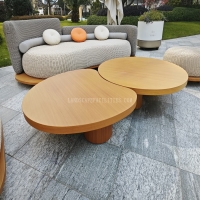Welcome to the website for landscape facilities products and knowledge.
How does the choice of base material (e.g., metal, wood, stone) impact the overall stability of a landscape bar counter?
The selection of base material fundamentally determines the structural integrity and longevity of landscape bar counters in outdoor environments. Metal bases, typically constructed from powder-coated aluminum or stainless steel, offer exceptional load-bearing capacity and resistance to deformation under varying temperatures. Their inherent rigidity prevents wobbling and maintains level surfaces even on uneven terrain, though proper corrosion treatment is essential for coastal environments.
Wooden foundations, particularly using naturally resilient species like teak or pressure-treated cedar, provide excellent vibration dampening and thermal insulation properties. However, wood requires meticulous sealing against moisture infiltration to prevent swelling, warping, or rot development that compromises structural stability. Regular maintenance becomes crucial for preserving dimensional stability in fluctuating humidity conditions.
Stone bases, including granite, quartzite, or manufactured composite materials, deliver unparalleled compressive strength and mass-derived stability. Their immense weight anchors the entire structure against wind forces and accidental impacts, though this necessitates professional foundation preparation. Natural stone's thermal mass properties help maintain surface temperature stability, but porous varieties require sealing against frost damage in colder climates.
The material choice directly influences installation methodologies. Metal frames often incorporate adjustable leveling feet for precision installation on sloped surfaces, while stone bases require permanent mortar bedding for proper weight distribution. Wooden structures benefit from elevated airflow designs to prevent moisture accumulation beneath the counter.
Environmental factors further differentiate material performance. Coastal installations favor marine-grade aluminum for salt spray resistance, while arid climates permit greater material flexibility. Urban environments might prioritize powder-coated metals for impact resistance, whereas rustic settings often leverage stone's natural aesthetic integration.
Ultimately, the optimal base material emerges from evaluating specific operational requirements, environmental conditions, and maintenance capabilities. Hybrid approaches combining metal structural framing with stone or wood cladding frequently deliver optimal stability while meeting aesthetic objectives, ensuring the landscape bar counter remains both functionally reliable and visually appealing through seasonal changes.
Related search:

Recommendation
Elliptical metal outdoor table with nested design, resembling wood grain, round table